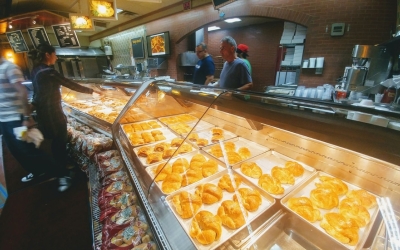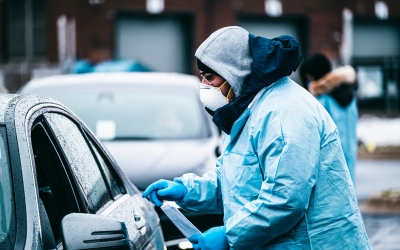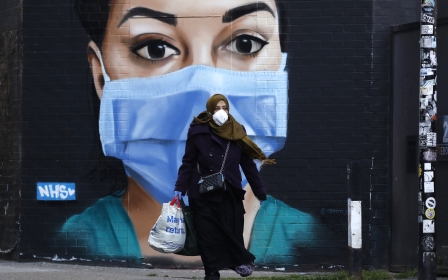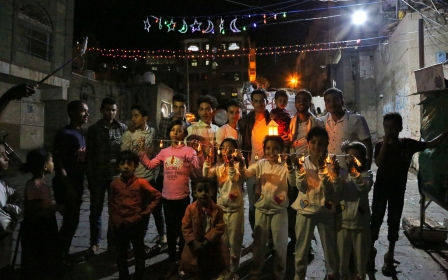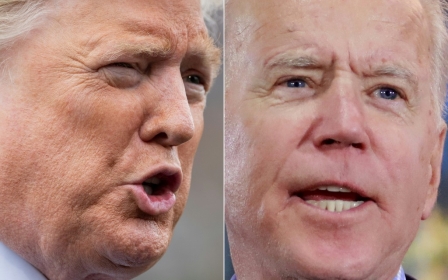Ramadan lights brighten spirits for Michigan Muslims under lockdown

Ramadan spirit is usually on full display in Dearborn, Michigan.
The city, known as the capital of Arab America, sees bakeries teeming with customers, mosques spilling over with worshippers and heavy traffic after midnight as families join together to socialise around feasts of Arab food.
This year, however, Ramadan has returned under unfortunate circumstances.
With social distancing guidelines in place due to the coronavirus pandemic, there will be no large gatherings. Mosques have temporarily shut their doors. There are fewer people around iftar tables and Dearborn's famed eateries are only serving food to go.
'What we're hoping is that in calling attention to the lights, we would be providing some of that cheer and some of that sense of celebration'
- Sally Howell, Halal Metropolis
Adjusting to the new realities, some activists are organising a "Ramadan Lights" contest to celebrate the holy month.
New MEE newsletter: Jerusalem Dispatch
Sign up to get the latest insights and analysis on Israel-Palestine, alongside Turkey Unpacked and other MEE newsletters
In a somewhat recent tradition, some Muslim Americans have started decorating the facades of their homes, and community groups are making a fun competition out of it.
Halal Metropolis, an arts and culture collaborative from the University of Michigan-Dearborn, the advocacy group Michigan Muslim Community Council, and Ramadan Suhoor Festival have announced a competition to pick the best lit-up homes for Ramadan in the area.
"Given Michigan's shelter in place orders, which have closed the state's mosques, museums, restaurants, and more, these organisations are hoping to create a bit of holiday cheer and to call attention to the local house decorating practices that make the city's Muslim community so visible in this special season," the groups said in a statement earlier this month.
Sense of celebration
Sally Howell, the co-founder of Halal Metropolis and a professor of Arab American studies at the University of Michigan-Dearborn, said an "exuberant street life" develops in and around Dearborn during Ramadan. But this year, Ramadan was going to inevitably change. Even the solidarity in communal prayers at the mosque will be missing.
"The restaurants, they're not going to be open. And there are not going to be these big parties or festivals taking place," Howell told MEE. "What we're hoping is that in calling attention to the lights, we would be providing some of that cheer and some of that sense of celebration."
Participants are encouraged to submit photos of their decorated homes via an online form.
Ramadan Suhoor Festival, which was cancelled this year, had brought thousands of people together last year for pre-dawn meals, known as suhoor, served by dozens of food trucks under rows of decorative lights.
The festival embodied the cheerful togetherness of Ramadan in Michigan's Muslim community.
Hassan Chami, a pharmacy owner who put the festival together, said the idea started a few years ago by bringing 10 pop-up food stands to a small parking lot in Dearborn.
The event was an instant success, drawing hundreds of people and prompting the organisers to move it to a larger space in the neighbouring city of Dearborn Heights. The expanded festival attracted huge crowds and grabbed the attention of local and national media outlets last year.
Chami said the festival aimed to create unity and bridge the gap between different components of the greater community - Shia and Sunnis; Arab Muslims and non-Arab Muslims; and Muslims and non-Muslims.
The event was also a charitable one, as the organisers donated the proceeds to the Amity Foundation, a local group that aids underprivileged families.
"We're going to continue on with the mission of sharing by donating N-95 masks to hospitals and funeral homes in the area," Chami told MEE.
As for the Ramadan Lights contest, Chami said it will be a celebration of the holy month.
"We'll make it a fun thing. The plan is to keep the spirit of Ramadan high and the community very festive during these hard times," Chami told MEE.
Acknowledging Ramadan
Kimberly Ismail, chair of Dearborn's City Beautiful Commission, a municipal body that promotes business and residential aesthetics, said she was "excited" that the contest will encourage more people to decorate their homes.
"It'll get more people to decorate and just acknowledge Ramadan a little bit more and make more of a presence in the city, which will be good because we need that," Ismail told MEE.
It was too late for the City Beautiful Commission to be officially involved in the contest, but Ismail herself will be a judge in the competition.
As part of the project, the organisers will highlight and promote community organisations and individuals doing humanitarian work during the Covid-19 pandemic.
"When I see our community stepping up and just going to town with all the giving that it does, there really isn't a more joyful presence than that," said Ismail, who won the Michigan Volunteer of the Year award from Governor Grechen Whitmer last year.
"And that's what I believe Ramadan really represents. It represents giving back to your community."
Dearborn City Council President Susan Dabaja, who is one of the judges for the Ramadan Lights contest, highlighted some positive aspects of the "different" conditions this year in a message she shared on Facebook.
"Staying home allows us more time to delve deeper into our relationship with God, connecting more spiritually with our inner-selves, and praying for better and healthier times for all humanity," she wrote.
"It allows us more time with our closest loved ones, whether they live with you or you connect virtually - because you’re not out rushing from one thing to another."
Howell, a historian who has written extensively about the Muslim community in Michigan, said the popularisation of Ramadan culture over the years turned night into day in Dearborn and lit the city up.
But as Ramadan celebrations become more visible in Michigan every year, anti-Muslim hate is on the rise nationwide, and Dearborn continues to be the target of misinformation campaigns about "creeping sharia" and "no go zones" by far-right internet users.
Earlier this week, President Donald Trump retweeted a divisive post antagonising Muslim Americans with a specific mention of Ramadan.
"Let's see if authorities enforce the social-distancing orders for mosques during Ramadan (April 23-May 23) like they did for churches during Easter," the post by conservative writer Paul Sperry said.
Howell said the "proud, confident, extroverted, unashamed" expression of Muslim identity may have an underlying message: "We belong here. This is our community. This is our city. We're American, too."
"What could be more American than holiday lights to decorate your house," the professor said.
Middle East Eye delivers independent and unrivalled coverage and analysis of the Middle East, North Africa and beyond. To learn more about republishing this content and the associated fees, please fill out this form. More about MEE can be found here.



